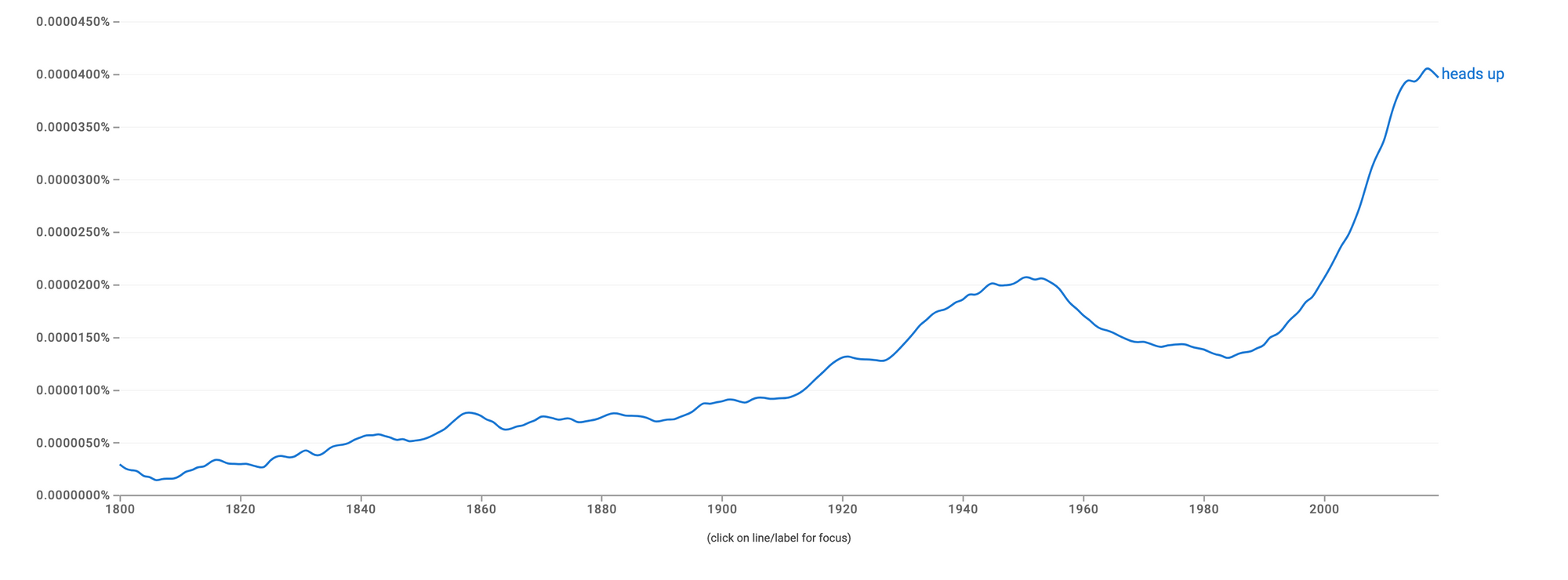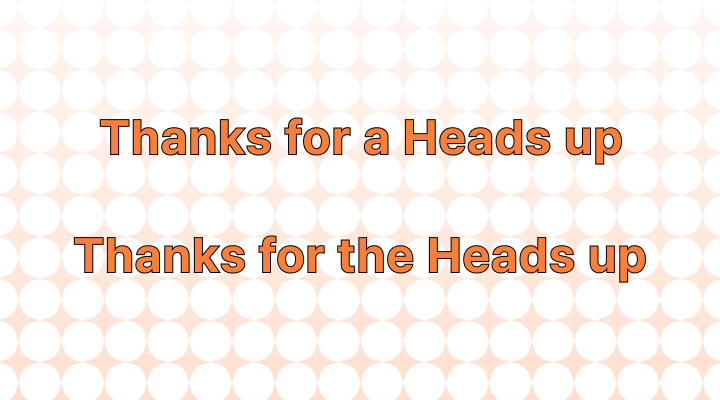- Thanks for a Heads Up: This phrase is used when expressing gratitude for a general alert or advance notice about something. Although correct, the phrase is not used frequently.
- Thanks for the Heads Up: This phrase is employed when acknowledging appreciation for a specific and previously mentioned heads-up or alert. This phrase is more commonplace.

What does the term "heads up" mean?
The term "heads up" is an informal expression that originated from sports and means to give advance notice, alert, or warning about something that is about to happen or a situation that requires attention. It is often used to inform or prepare someone for an upcoming event, change, or potential issue.
The term "heads up" has its origins in sports, particularly in games where players need to be alert and aware of their surroundings. In sports like football, soccer, and baseball, players use the phrase as a way to warn teammates about an incoming ball or potential collision, prompting them to be vigilant and ready to react.
The concept of a "heads up" gesture, where players raise their heads to be more aware of what's happening on the field, became a visual signal for attentiveness. Over time, this expression extended beyond sports and entered everyday language as a colloquial way to give someone notice or warning about something.
Examples from the web
"... Tejada said of the seven-run deficit: "It's a little bit high, but it's quite possible.We kept our heads up".The ninth run came in handy for the Mets because Xavier Paul led off the ninth with a triple off Francisco ..." - The New York Times - Sports
"Heads up, Google. Facebook is testing a new format of search ads called Sponsored Results that lets advertisers show ads ..." - TechCrunch
"Heads up, sports fans. Today's the day when you can start your search for the Samsung Magnet at your local AT&T mall kiosk ..." - TechCrunch
More example sentence
Time Reminder
- "Just a heads up, the meeting starts in 10 minutes."
Weather Alert
- "Heads up, there's a storm coming, so secure any loose items outside."
Important Information
- "Before you go, I wanted to give you a heads up about the new project requirements."
Impending Deadline
- "Heads up, the deadline for submitting your proposal is tomorrow."
Team Communication
- "Team, heads up! We'll be having a brief huddle before we start the day."
From the below graph, you can see that the term "heads up" has become a more frequently used term, starting from the 1970s.

What is the Difference: "Thanks for a Heads Up" vs. "Thanks for the Heads Up"
The key disparity lies in the inclusion of the definite article "the", which changes the meaning slightly.
When to Use: "Thanks for a Heads Up" vs. "Thanks for the Heads Up"
Thanks for a Heads Up
Appropriate when expressing general gratitude for any alert or advance notice. This phrase is used less than "Thanks for the heads up."
- Example: "Thanks for a heads up about the meeting time change!"
Thanks for the Heads Up
Suitable when expressing gratitude for a specific heads-up that has been previously mentioned or is understood in context.
- Example: "Thanks for the heads up about the traffic; I took an alternate route."
The Definite Article "the": If the alert is specific and previously mentioned or understood, use "Thanks for the Heads Up." Otherwise, use "Thanks for a Heads Up" for general appreciation.
Synonyms:
- Alert: Expressing appreciation for being alerted to a situation.
- Advance Notice: Acknowledging thanks for receiving information ahead of time.
Common Idioms
- Give a Heads Up: To alert or inform someone about something in advance.
- On the Ball: Acknowledging someone for being attentive and alert.
Summary
In conclusion, mastering the difference between "Thanks for a Heads Up" and "Thanks for the Heads Up" allows for precise and effective communication. Whether expressing general gratitude or acknowledging appreciation for a specific heads-up, understanding this distinction ensures your thanks are communicated with clarity and intent.
Want to sound like a native speaker?
Engram’s AI-powered grammar checker makes your English sound like a native speaker’s, suggesting natural English expressions on top of fixing grammar, spelling, punctuation, word order, and vocabulary.















